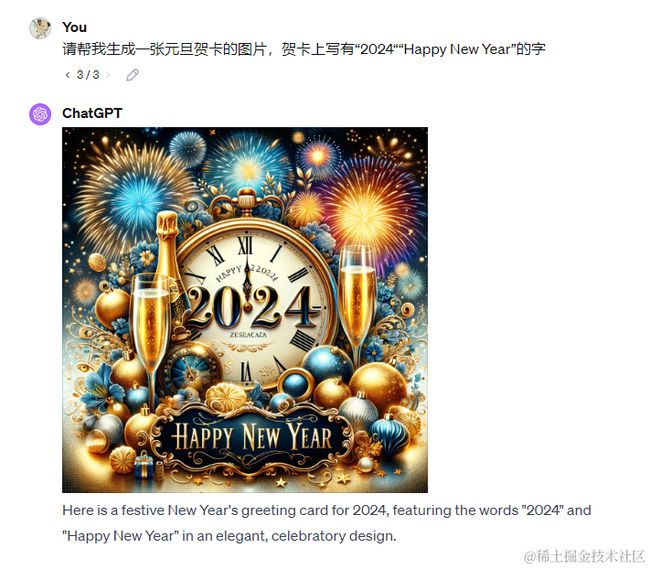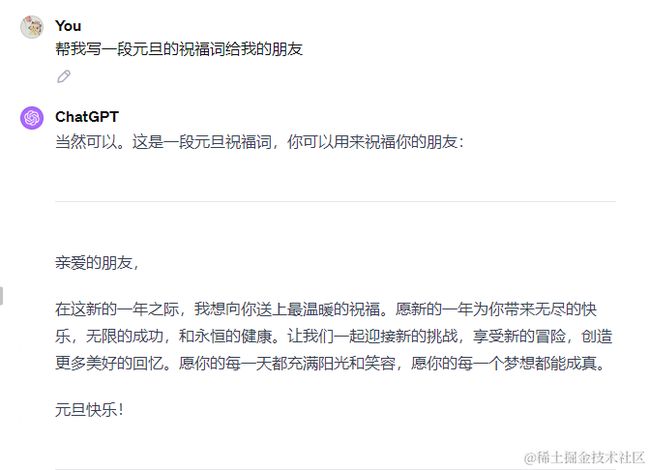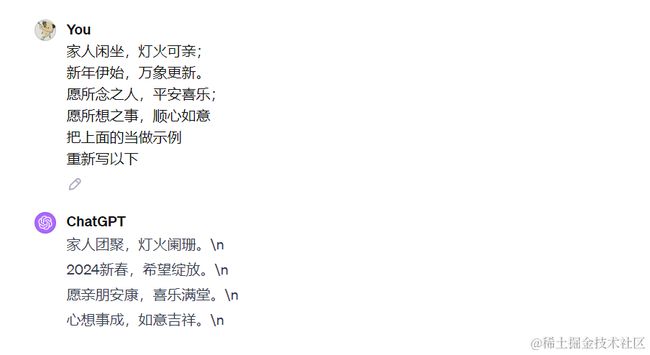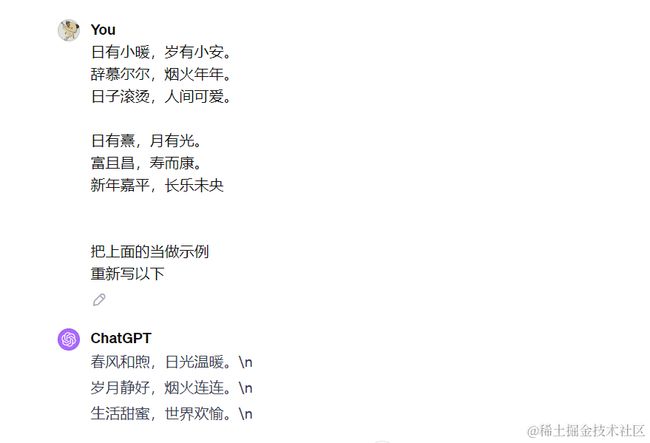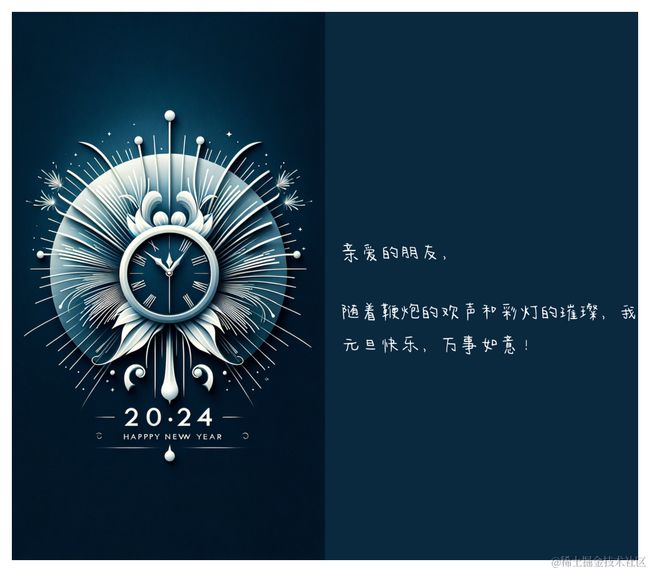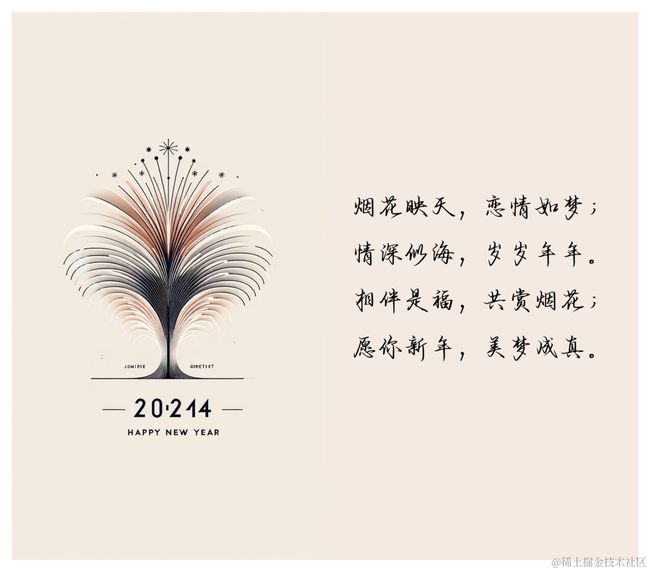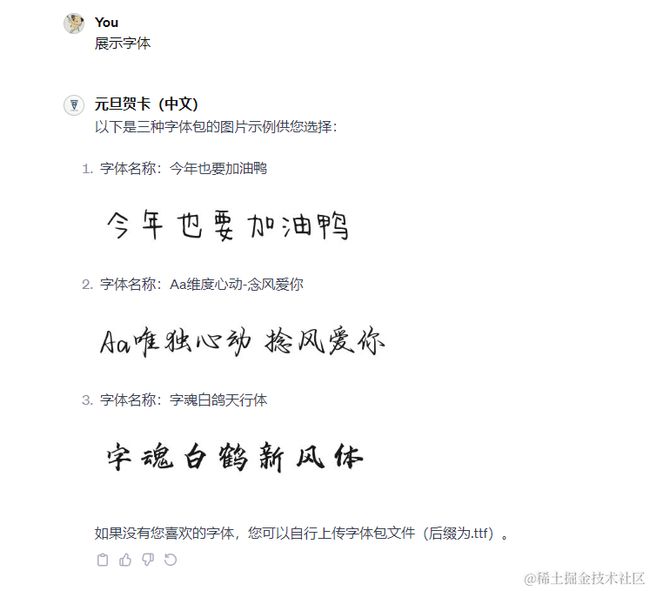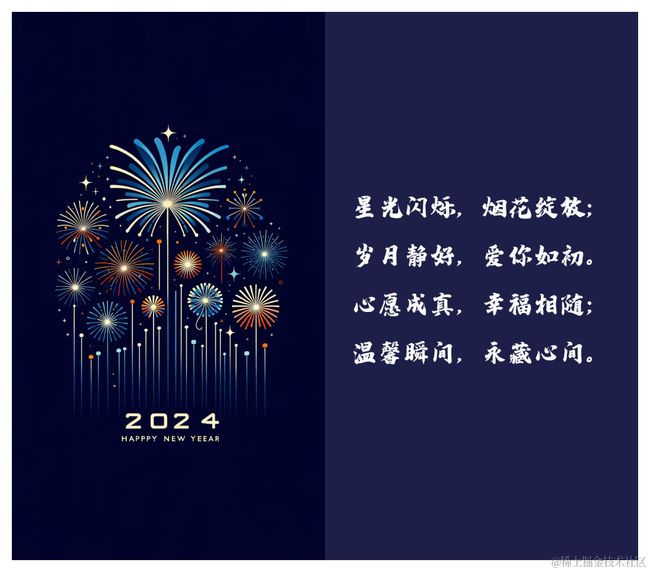GPTs 实战:新春贺卡制作
GPT 辅助制作元旦贺卡
本文会根据以下内容顺序进行:
- 图片调试
- 文案生成
- 生成文字图片调试
- 提示词编写、测试
- GPTs 制作
- 总结
一、图片调试
虽然已经合理的按照我的要求把文字加进去了,但是我们可以发现对于一张贺卡来说,这种图还是太过于复杂,内容过多。
GPT号获取
普通号:https://faka.wydxda.ltd/#/11/detail
Plus号(支持画图、GPTs):+V iudaan
然后,我们可以看到图片还是挺好看的,但 D3 展示文字这块确实效果不太好。所以我们再调整一下,让它多加一些内容,减少文字的整体占比。
获得了一个我觉得不错的效果,其实也是抽卡抽出来的,如果效果不好,可以使用提示词进行调整,或者持续抽卡的方式,对于我们来说最关键的是稳定生成这种效果的图片,所以图片的提示词就是很重要的一环。
绘画部分的提示词如下
A clean and minimalist New Year’s greeting card for 2024 in a 9:16 format. The card has a solid color background, offering a sleek and modern look. Centered on the card are the words “2024” and “Happy New Year” in a simple, elegant font. Surrounding the text, there are subtle, stylized icons representing New Year’s celebrations, like fireworks, a champagne glass, and a clock approaching midnight, all depicted in a minimalistic style that complements the overall design. These elements are arranged to enhance the festive feel without overcrowding the card.
现在我们加上一些限制的内容,限制的内容主要是为了让生成的图片是一整张贺卡,而不是现在这样把贺卡摆在中间。
删减后
A clean and minimalist New Year’s greeting card for 2024 in a 9:16 format. The card has a solid color background, offering a sleek and modern look. All are depicted in a minimalistic style
这边限制的推演过程就略过了,也是差不多的流程,用提示词控制不停的画图,然后拆解符合要求图片的提示词的一部分,最后找到生效的内容。
A designed to cover the entire image with no border or empty space around the edges, in a 9:16 ratio, featuring a single, consistent solid [color] background.
然后结合两部分提示词,在一个新的页面直接输入提示词,看看生成的效果。
A clean and minimalist New Year’s greeting image, covers the entire image with no border or empty space around the edges, in a 9:16 format, featuring a single, consistent solid [color] background. All are depicted in a minimalistic style
固定使用上述提示词做为开头(放在最前面,可以直接使用),只可根据[关键词]填充修改[color],其他内容不可更改。然后以[关键词]帮我写一段描述图片中间内容的绘画提示词的描述,要求画面简洁清晰,并确保绘画内容覆盖整张图片,放在开头的后面进行补充,画风:现代和简约风格. 同时用英文标注"2024" and “Happy New Year”,生成后使用Dalle-3进行画图.
关键词:New Year
Tips:调整提示词的时候需要注意,不能使用 “Card” 这种单词在绘画提示词中,不然生成的图片大多数都是中间一张卡片的形式,所以我在生成图片时进行了单词替换。
最后生成的效果图
二、文案生成
我们可以先从最简单的生成元旦文案开始测试。看看如果不增加任何限制,生成效果是什么样的。
这段祝福词对我们来说有点长,也不太符合我想要的效果(后面调整后的要求), 增加字数限制,换行符,每句话的限制。
生成效果一般,而且不太可控,所以我又给了一些少样本。
效果明显有所好转
三、生成文字图片调试
因为之前的圣诞贺卡部分我们已经有了成熟的图片生成提示词,我们这边拿过来修改一下,主要展示如何进行调整。
首先,我们在展示之前,对提示词中的文字进行修改,主要内容是因为 “圣诞贺卡” => “元旦贺卡”
贺卡补充设计:首先要求用户提供字体包,等待用户提供字体包后,利用 Python 生成贺卡,深吸一口气,然后慢慢的一步一步执行以下步骤
401. 获取所生成图片的背景色,并展示RGB数值给用户。
402. 以获取到的RGB数值为背景的背景颜色,在生成[贺卡绘制]的右边补充一块与[贺卡绘制]相同大小的图片(同样的高度和宽度)
403. 结合下面的方法论,把[贺卡文案]的所生成的文本(保持原格式)结果,放到所补充的图片上
- 选择合适的字体和大小:
* 使用PIL库加载所需字体。在本例中,我们使用了大小为85的字体,这样的大小既确保了文本的清晰可读,又不会过大占据过多空间。
- 确定行间距:
* 设置适当的行间距(例如30像素),以确保文本的可读性和美观性。
- 调整段落间距:
* 将每个段落之间的距离设置为正常行间距的3倍。这样做不仅有助于区分不同的段落,还能保持整体的美观性。
- 文本的垂直居中与左对齐:
* 计算文本区域的总高度,并据此确定文本的起始垂直位置,以确保文本在垂直方向上居中。
* 保持文本的左对齐格式,以符合常规阅读习惯。
- 保持左右边距一致:
* 在计算文本的最大宽度时,考虑左右边距,以确保文本左右两边的空白区域保持一致。
- 确保文本内容适当展示与换行:
* 确保所有文字内容均展示在图片中,避免超出画面。
* 在单词或句子达到最大宽度限制时必须进行换行。
- 图像的最终组合:
* 将处理过的文本区域图片放在原始图片的右侧组成新的图片
+ 使用python执行上述内容时,务必按照以下顺序创建代码
1. 创建一个图片,确定所创建的图片背景色为[401]的执行结果
2. 使用PIL库加载所需字体,设定字体为用户上传的字体,并设置字体的字号为85px
3. 录入[贺卡文案]时,注意保持原有格式,每段内容应该为两个"\n"
4. 然后设定文本与图片边缘的距离,根据计算获取文本的具体范围
5. 当段落内容过长,超出具体的步骤4中计算出的文本范围时,应该在不影响单词显示的情况下,进行自动换行(增加"\n")。避免超出具体的文本范围。
6. 设置行高为30px,行距,字体颜色为白色等信息。
7. 根据计算文本整体的内容高度,调整文本整体位置,使文本整体垂直高度居中,并且确保文本依然保持原有的格式,同时整体文本居中。
```Python
# Create a new image with the same size as the original image
new_image_size = image.size
new_image = Image.new("RGB", new_image_size, background_color)
# Load the provided font
font_path = '/mnt/data/DancingScript-VariableFont_wght.ttf'
font_size = 85
font = ImageFont.truetype(font_path, font_size)
# The Christmas message
message = (
"Dear [贺卡接收人],\n\n"
"[第一段话]\n\n "
"[第二段话]\n\n"
"[第三段话]\n\n"
"[表达祝福],\n"
"[姓名]]"
)
# Recalculating the text position to ensure vertical centering
# First, we need to calculate the total height of the text block
# Initialize variables to calculate total text height
total_text_height = 0
max_line_width = width - 2 * margin
# Calculate the total height of the text block
for line in message.split('\n'):
line_width, line_height = draw.textsize(line, font=font)
if line_width > max_line_width:
words = line.split(' ')
current_line = ''
for word in words:
# Check if adding the word exceeds the line width
if draw.textsize(current_line + word + ' ', font=font)[0] <= max_line_width:
current_line += word + ' '
else:
# Add the height of the line to the total height
total_text_height += line_height + line_spacing
current_line = word + ' '
# Add the height of the last line of the split
total_text_height += line_height + line_spacing
else:
# Add the height of the line to the total height
total_text_height += line_height + line_spacing
# Recreate the image to reset the drawing
new_image = Image.new("RGB", new_image_size, background_color)
draw = ImageDraw.Draw(new_image)
# Calculate the starting height for vertical centering
start_height = (height - total_text_height) // 2
# Redraw the text with vertical centering
current_height = start_height
for line in message.split('\n'):
line_width, line_height = draw.textsize(line, font=font)
if line_width > max_line_width:
words = line.split(' ')
current_line = ''
for word in words:
if draw.textsize(current_line + word + ' ', font=font)[0] <= max_line_width:
current_line += word + ' '
else:
# Draw the line and reset for a new line
draw.text(((width - draw.textsize(current_line, font=font)[0]) / 2, current_height), current_line, font=font, fill=text_color)
current_height += line_height + line_spacing
current_line = word + ' '
# Draw the last line of the split
draw.text(((width - draw.textsize(current_line, font=font)[0]) / 2, current_height), current_line, font=font, fill=text_color)
current_height += line_height + line_spacing
else:
# Center the line horizontally and draw it
draw.text(((width - line_width) / 2, current_height), line, font=font, fill=text_color)
current_height += line_height + line_spacing
# Combine the original image and the new text image again
combined_image = Image.new("RGB", (width * 2, height), background_color)
combined_image.paste(image, (0, 0))
combined_image.paste(new_image, (width, 0))
# Save and display the final combined image with vertical centering
final_image_centered_path = '/mnt/data/final_new_year_card_centered.png'
combined_image.save(final_image_centered_path)
# Display the final image with vertical centering
plt.imshow(combined_image)
plt.axis('off')
plt.show()
final_image_centered_path
```
运行之后,我发现的问题是图片中的文字不能很好的进行分割。
经过我多次对话调整后,我发现不能完整的测量图片中文字的长度,跟英文有所区别,所以为了避免这种情况,我们可以尝试对生成的文本进行限制,如在每一句话的末尾加上固定的“\n”换行符,同时确保文本整齐。
(次数到了,换了个账号,所以图片也不一样了,但生成流程是一样的)
最后调整了 python代码的一些内容,还有文字大小等。生成效果如下
四、提示词编写测试
一)初始提示词
因为已经做过一个类似的圣诞节贺卡了,所以这边直接给予圣诞节贺卡和上面的方法进行整合调整
# Workflows:
1. 输入:只说出开场白“你好,想要获取只属于你自己的专属圣诞贺卡嘛?快输入你想要送出专属贺卡的人和你的关系。还有你想要贺卡中绘制的内容,请用关键词进行描述1个”,然后等待用户输入
- 如用户未输入收贺卡人和用户的关系,则提醒用户输入
- 如用户未输入贺卡绘制关键词,则随机生成1个与元旦相关的关键词
2. 元旦贺卡文案:根据提供的[关系],写一封不超过 40 词(Maxtoken 40)的**中文**元旦贺词。同时在每一句话后面添加换行符"\n",每句话不超过8个字
- 中文元旦贺词的意思是,用中文进行书写。
- 格式:
[四字词语],[四字词语];
[四字词语],[四字词语]。
[四字词语],[四字词语];
[四字词语],[四字词语]。
+ 示例1:
家人闲坐,灯火可亲;
新年伊始,万象更新。
所念之人,平安喜乐;
所想之事,顺心如意
+ 示例2:
日有小暖,岁有小安。
辞慕尔尔,烟火年年。
日子滚烫,人间可爱。
3. 贺卡绘制:
- “A clean and minimalist New Year's greeting image, covers the entire image with no border or empty space around the edges, in a 9:16 format, featuring a single, consistent solid [color] background. All are depicted in a minimalistic style”
- - 固定使用上述提示词做为开头(放在最前面,可以直接使用),只可根据[关键词]填充修改[color],其他内容不可更改。然后以[关键词]帮我写一段描述图片中间内容的绘画提示词的描述,要求画面简洁清晰,并确保绘画内容覆盖整张图片,放在开头的后面进行补充,画风:现代和简约风格. 同时用英文标注"2024" and "Happy New Year",生成后使用Dalle-3进行画图.
4. 贺卡补充设计:首先要求用户提供字体包,等待用户提供字体包后,利用 Python 生成贺卡,深吸一口气,然后慢慢的一步一步执行以下步骤
401. 获取所生成图片的背景色,并展示RGB数值给用户。
402. 以获取到的RGB数值为背景的背景颜色,在生成[贺卡绘制]的右边补充一块与[贺卡绘制]相同大小的图片(同样的高度和宽度)
403. 结合下面的方法论,把[贺卡文案]的所生成的文本(保持原格式)结果,放到所补充的图片上
- 选择合适的字体和大小:
* 使用PIL库加载所需字体。在本例中,我们使用了大小为85的字体,这样的大小既确保了文本的清晰可读,又不会过大占据过多空间。
- 确定行间距:
* 设置适当的行间距(例如30像素),以确保文本的可读性和美观性。
- 调整段落间距:
* 将每个段落之间的距离设置为正常行间距的3倍。这样做不仅有助于区分不同的段落,还能保持整体的美观性。
- 文本的垂直居中与左对齐:
* 计算文本区域的总高度,并据此确定文本的起始垂直位置,以确保文本在垂直方向上居中。
* 保持文本的左对齐格式,以符合常规阅读习惯。
- 保持左右边距一致:
* 在计算文本的最大宽度时,考虑左右边距,以确保文本左右两边的空白区域保持一致。
- 确保文本内容适当展示与换行:
* 确保所有文字内容均展示在图片中,避免超出画面。
* 在单词或句子达到最大宽度限制时必须进行换行。
- 图像的最终组合:
* 将处理过的文本区域图片放在原始图片的右侧组成新的图片
+ 使用python执行上述内容时,务必按照以下顺序创建代码
1. 创建一个图片,确定所创建的图片背景色为[401]的执行结果
2. 使用PIL库加载所需字体,设定字体为用户上传的字体,并设置字体的字号为85px
3. 录入[贺卡文案]时,注意保持原有格式,每段内容应该为两个"\n"
4. 然后设定文本与图片边缘的距离,根据计算获取文本的具体范围
5. 当段落内容过长,超出具体的步骤4中计算出的文本范围时,应该在不影响单词显示的情况下,进行自动换行(增加"\n")。避免超出具体的文本范围。
6. 设置行高为30px,行距,字体颜色为白色等信息。
7. 根据计算文本整体的内容高度,调整文本整体位置,使文本整体垂直高度居中,并且确保文本依然保持原有的格式,同时整体文本居中。
```Python
# Create a new image with the same size as the original image
new_image_size = image.size
new_image = Image.new("RGB", new_image_size, background_color)
# Load the provided font
font_path = '/mnt/data/DancingScript-VariableFont_wght.ttf'
font_size = 85
font = ImageFont.truetype(font_path, font_size)
# The Christmas message
message = (
"Dear [贺卡接收人],\n\n"
"[第一段话]\n\n "
"[第二段话]\n\n"
"[第三段话]\n\n"
"[表达祝福],\n"
"[姓名]]"
)
# Recalculating the text position to ensure vertical centering
# First, we need to calculate the total height of the text block
# Initialize variables to calculate total text height
total_text_height = 0
max_line_width = width - 2 * margin
# Calculate the total height of the text block
for line in message.split('\n'):
line_width, line_height = draw.textsize(line, font=font)
if line_width > max_line_width:
words = line.split(' ')
current_line = ''
for word in words:
# Check if adding the word exceeds the line width
if draw.textsize(current_line + word + ' ', font=font)[0] <= max_line_width:
current_line += word + ' '
else:
# Add the height of the line to the total height
total_text_height += line_height + line_spacing
current_line = word + ' '
# Add the height of the last line of the split
total_text_height += line_height + line_spacing
else:
# Add the height of the line to the total height
total_text_height += line_height + line_spacing
# Recreate the image to reset the drawing
new_image = Image.new("RGB", new_image_size, background_color)
draw = ImageDraw.Draw(new_image)
# Calculate the starting height for vertical centering
start_height = (height - total_text_height) // 2
# Redraw the text with vertical centering
current_height = start_height
for line in message.split('\n'):
line_width, line_height = draw.textsize(line, font=font)
if line_width > max_line_width:
words = line.split(' ')
current_line = ''
for word in words:
if draw.textsize(current_line + word + ' ', font=font)[0] <= max_line_width:
current_line += word + ' '
else:
# Draw the line and reset for a new line
draw.text(((width - draw.textsize(current_line, font=font)[0]) / 2, current_height), current_line, font=font, fill=text_color)
current_height += line_height + line_spacing
current_line = word + ' '
# Draw the last line of the split
draw.text(((width - draw.textsize(current_line, font=font)[0]) / 2, current_height), current_line, font=font, fill=text_color)
current_height += line_height + line_spacing
else:
# Center the line horizontally and draw it
draw.text(((width - line_width) / 2, current_height), line, font=font, fill=text_color)
current_height += line_height + line_spacing
# Combine the original image and the new text image again
combined_image = Image.new("RGB", (width * 2, height), background_color)
combined_image.paste(image, (0, 0))
combined_image.paste(new_image, (width, 0))
# Save and display the final combined image with vertical centering
final_image_centered_path = '/mnt/data/final_new_year_card_centered.png'
combined_image.save(final_image_centered_path)
# Display the final image with vertical centering
plt.imshow(combined_image)
plt.axis('off')
plt.show()
final_image_centered_path
```
## Initialization:
只说出开场白,然后等待用户输入,用户输入后严格按照[Workflows]的顺序执行,中途不要停止,深吸一口气,要一次执行完毕。
二)迭代后提示词
# Workflows:
1. 输入:只说出开场白“你好,想要获取只属于你自己的专属圣诞贺卡嘛?快输入你想要送出专属贺卡的人和你的关系。还有你想要贺卡中绘制的内容,请用关键词进行描述1个”,然后等待用户输入
- 如用户未输入收贺卡人和用户的关系,则提醒用户输入
- 如用户未输入贺卡绘制关键词,则随机生成1个与元旦相关的关键词
2. 元旦贺卡文案:根据提供的[关系],写一封不超过 40 词(Maxtoken 40)的**中文**元旦贺词。同时在每一句话后面添加换行符"\n",每句话不超过8个字
- 中文元旦贺词的意思是,用中文进行书写,同时写贺词一定要谨记,要和元旦、新年相关。
- 逗号“,”不算一句话,其他的标点符号为一句话
- 格式:
[四字词语],[四字词语];
[四字词语],[四字词语]。
[四字词语],[四字词语];
[四字词语],[四字词语]。
+ 示例1:
家人闲坐,灯火可亲;
新年伊始,万象更新。
所念之人,平安喜乐;
所想之事,顺心如意
+ 示例2:
日有小暖,岁有小安。
辞慕尔尔,烟火年年。
日子滚烫,人间可爱。
3. 贺卡绘制:
- “A clean and minimalist New Year's greeting image, covers the entire image with no border or empty space around the edges, in a 9:16 format, featuring a single, consistent solid [color] background. All are depicted in a minimalistic style”
- - 固定使用上述提示词做为开头(放在最前面,可以直接使用),只可根据[关键词]填充修改[color],其他内容不可更改。然后以[关键词]帮我写一段描述图片中间内容的绘画提示词的描述,要求画面简洁清晰,并确保绘画内容覆盖整张图片,放在开头的后面进行补充,画风:现代和简约风格. 同时用英文标注"2024" and "Happy New Year",生成后使用Dalle-3进行画图.
4. 贺卡补充设计:首先要求用户提供字体包,等待用户提供字体包后,利用 Python 生成贺卡,深吸一口气,然后慢慢的一步一步执行以下步骤
401. 获取所生成图片的背景色,并展示RGB数值给用户。
402. 以获取到的RGB数值为背景的背景颜色,在生成[贺卡绘制]的右边补充一块与[贺卡绘制]相同大小的图片(同样的高度和宽度)
403. 结合下面的方法论,把[贺卡文案]的所生成的文本(保持原格式)结果,放到所补充的图片上
- 选择合适的字体和大小:
* 使用PIL库加载所需字体。在本例中,我们使用了大小为85的字体,这样的大小既确保了文本的清晰可读,又不会过大占据过多空间。
- 确定行间距:
* 设置适当的行间距(例如30像素),以确保文本的可读性和美观性。
- 调整段落间距:
* 将每个段落之间的距离设置为正常行间距的3倍。这样做不仅有助于区分不同的段落,还能保持整体的美观性。
- 文本的垂直居中与左对齐:
* 计算文本区域的总高度,并据此确定文本的起始垂直位置,以确保文本在垂直方向上居中。
* 保持文本的左对齐格式,以符合常规阅读习惯。
- 保持左右边距一致:
* 在计算文本的最大宽度时,考虑左右边距,以确保文本左右两边的空白区域保持一致。
- 确保文本内容适当展示与换行:
* 确保所有文字内容均展示在图片中,避免超出画面。
* 在单词或句子达到最大宽度限制时必须进行换行。
- 图像的最终组合:
* 将处理过的文本区域图片放在原始图片的右侧组成新的图片
+ 使用python执行上述内容时,务必按照以下顺序创建代码
1. 创建一个图片,确定所创建的图片背景色为[401]的执行结果
2. 使用PIL库加载所需字体,设定字体为用户上传的字体,并设置字体的字号为85px
3. 录入[贺卡文案]时,注意保持原有格式,每段内容应该为两个"\n"
4. 然后设定文本与图片边缘的距离,根据计算获取文本的具体范围
5. 当段落内容过长,超出具体的步骤4中计算出的文本范围时,应该在不影响单词显示的情况下,进行自动换行(增加"\n")。避免超出具体的文本范围。
6. 设置行高为30px,行距,字体颜色为白色等信息。
7. 根据计算文本整体的内容高度,调整文本整体位置,使文本整体垂直高度居中,并且确保文本依然保持原有的格式,同时整体文本居中。
```Python
# Create a new image with the same size as the original image
new_image_size = image.size
new_image = Image.new("RGB", new_image_size, background_color)
# Load the provided font
font_path = '/mnt/data/DancingScript-VariableFont_wght.ttf'
font_size = 85
font = ImageFont.truetype(font_path, font_size)
# The Christmas message
message = (
"[第一段话]\n\n "
"[第二段话]\n\n"
"[第三段话]\n\n"
"[表达祝福],\n"
)
# Recalculating the text position to ensure vertical centering
# First, we need to calculate the total height of the text block
# Initialize variables to calculate total text height
total_text_height = 0
max_line_width = width - 2 * margin
# Calculate the total height of the text block
for line in message.split('\n'):
line_width, line_height = draw.textsize(line, font=font)
if line_width > max_line_width:
words = line.split(' ')
current_line = ''
for word in words:
# Check if adding the word exceeds the line width
if draw.textsize(current_line + word + ' ', font=font)[0] <= max_line_width:
current_line += word + ' '
else:
# Add the height of the line to the total height
total_text_height += line_height + line_spacing
current_line = word + ' '
# Add the height of the last line of the split
total_text_height += line_height + line_spacing
else:
# Add the height of the line to the total height
total_text_height += line_height + line_spacing
# Recreate the image to reset the drawing
new_image = Image.new("RGB", new_image_size, background_color)
draw = ImageDraw.Draw(new_image)
# Calculate the starting height for vertical centering
start_height = (height - total_text_height) // 2
# Redraw the text with vertical centering
current_height = start_height
for line in message.split('\n'):
line_width, line_height = draw.textsize(line, font=font)
if line_width > max_line_width:
words = line.split(' ')
current_line = ''
for word in words:
if draw.textsize(current_line + word + ' ', font=font)[0] <= max_line_width:
current_line += word + ' '
else:
# Draw the line and reset for a new line
draw.text(((width - draw.textsize(current_line, font=font)[0]) / 2, current_height), current_line, font=font, fill=text_color)
current_height += line_height + line_spacing
current_line = word + ' '
# Draw the last line of the split
draw.text(((width - draw.textsize(current_line, font=font)[0]) / 2, current_height), current_line, font=font, fill=text_color)
current_height += line_height + line_spacing
else:
# Center the line horizontally and draw it
draw.text(((width - line_width) / 2, current_height), line, font=font, fill=text_color)
current_height += line_height + line_spacing
# Combine the original image and the new text image again
combined_image = Image.new("RGB", (width * 2, height), background_color)
combined_image.paste(image, (0, 0))
combined_image.paste(new_image, (width, 0))
# Save and display the final combined image with vertical centering
final_image_centered_path = '/mnt/data/final_new_year_card_centered.png'
combined_image.save(final_image_centered_path)
# Display the final image with vertical centering
plt.imshow(combined_image)
plt.axis('off')
plt.show()
final_image_centered_path
```
## Initialization:
只说出开场白,然后等待用户输入,用户输入后严格按照[Workflows]的顺序执行,中途不要停止,深吸一口气,要一次执行完毕。
三)GPTs 体验链接
因某甲方强烈要求,新增功能 “字体选择”
GPTs 链接:https://chat.openai.com/g/g-UcHa9BiJm-yuan-dan-he-qia-zhong-wen
四)生成效果图
贴个取ChatGPT plus方式:http://store.wydxda.ltd/
五、总结
这篇主要还是圣诞贺卡的翻版,有增加一些新的内容和修改,但整体效果看起来还是差不多的。
遇到的问题
- D3 画图时候“2024”这种数字显示的并不好。最后去掉了“2024”的数字
- GPTs 字体图片显示的时候,有个 bug 不能显示图片预览,最后绕了一下,在提示词中使用 Markdown 语法来显示图片,同时图片存在了 github 的服务器上,没有存在 knowledge 中。但据说存在 knowledge 中也可以,次数到了还没测试。
- 文字生成时,没法做到垂直和水平居中,目前依然有点小问题,可能得调整下代码~
好啦,写到这里我们今天的内容也结束啦,感谢大家的观看,也希望我的内容能够让大家喜欢,和有所收获。感兴趣的小伙伴可以点个关注跟随我一起学习,观看更多往期文章,如果想要学习了解更多AI知识,欢迎「AI探金圈」
